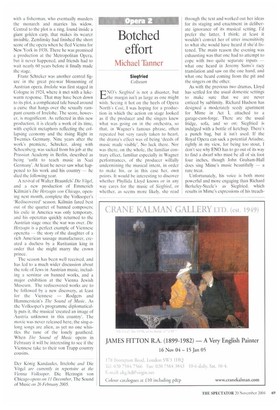Austrian resurrection
Petroc Trelawny
Vienna
When the Kaiserjubilaums Stadttheater opened here in 1898, it was heralded as one of the finest theatres in the city. An intimate house, with good acoustics and clear sight lines, it was intended to stage lyric drama alongside opera and dance. But its founders made one major mistake. With political anti-Semitism on the rise, they declared that it was to be a purely German theatre. Jewish actors and musicians would not be engaged.
They had severely miscalculated the make-up of Imperial Vienna's artistic community. An acute shortage of non-Jewish performers meant it was almost impossible to cast anything. When the curtain eventually went up, singers and actors faced row after row of empty seats. Jews made up 70 per cent of the regular audience at other Viennese cultural institutions. If they stayed away from the Kaiser's Jubilee Theatre, it faced a bleak future.
After a few lean years, the anti-Jewish policy was abandoned in 1904, along with lyric drama and the theatre's already oldfashioned-sounding name. New signs pro
claimed the birth of the Volksoper Wien, with its confident message: opera and operetta for the people. With Alexander Zemlinsky appointed as chief conductor, it soon became home to, among others, a group of highly talented Jewish musicians. Over the following three decades, they produced a series of radical and influential works until they were stopped in their tracks by the Anschluss.
Zemlinsky is one of the composers featured in the Volksoper's centenary season. At its heart are four works banned by the Nazis and subsequently forgotten — Wieder entdeckte Musik or 'Rediscovered music'. Though Zemlinsky was raised as a Jew, his father had originally been Catholic, and a maternal grandparent was Muslim. A student at the Vienna Conservatoire, he taught Schoenberg, dated Alma Schindler before she married Mahler, conducted premieres of works by Smetana and Janacek in Prague, and turned down the job of music director at the Staatsoper in Berlin. He had a distinguished career, yet when he died in exile in America in 1942 his passing was barely mentioned in the European press.
The composer appears as a character in the Volksoper's staging of his opera Der Konig Kandaules. At the start, he walks on carrying a music stand and a battered leather suitcase, the universal symbol of the exile. He remains on stage throughout, offering silent commentary on both the opera and his position as a displaced citizen. Based on a novel by Andre Gide, Kandaules tells of the King's relationship with a fisherman, who eventually murders the monarch and marries his widow, Central to the plot is a ring, found inside a giant golden carp, that makes its wearer invisible. Zemlinsky had finished the short score of the opera when he fled Vienna for New York in 1938. There he was promised a production at the Metropolitan Opera, but it never happened, and friends had to wait nearly 60 years before it finally made the stage.
Franz Schreker was another central figure in the great pre-war blossoming of Austrian opera. Irrelohe was first staged in Cologne in 1924, where it met with a lukewarm response. That may have been down to its plot, a complicated tale based around a curse that hangs over the sexually rampant counts of Irrelohe. The score, however, is magnificent. As reflected in this new production, it is clearly a work of its time, with explicit metaphors reflecting the collapsing economy and the rising Right in Twenties Germany. Nine years after the work's premiere, Schrcker, along with Schoenberg, was sacked from his job at the Prussian Academy in Berlin, described as being 'unfit to teach music in Nazi Germany'. At least he never saw what happened to his work and his country — he died the following year.
A revival of Walter Braunfels' Die Vogel, and a new production of Emmerich Kalman's Die Herzogin von Chicago, opening next month, complete the Volksoper's 'Rediscovered' season. Kalman fared best out of the quartet of banned composers; his exile in America was only temporary, and his operettas quickly returned to the Austrian stage once the war was over. Die Herzogin is a perfect example of Viennese operetta — the story of the daughter of a rich American sausage manufacturer, created a duchess by a Ruritanian king in order that she might marry the crown prince.
The season has been well received, and has led to a much wider discussion about the role of Jews in Austrian music, including a seminar on banned works, and a major exhibition at the Vienna Jewish Museum. The rediscovered works are to be followed by a new discovery, at least for the Viennese — Rodgers and Hammerstein's The Sound of Music. As the Volksoper's programme diplomatically puts it, the musical 'created an image of Austria unknown in this country'. The movie was never released here, the sing-along songs are alien, as yet no one whistles the tune of the lonely goatherd, When The Sound of Music opens in February it will be interesting to see if the Viennese take to their von Trapp country cousins.
Der Konig Kandaules, Irrelohe and Die Vogel are currently in repertoire at the Vienna Volksoper. Die Herzogin von Chicago opens on 11 December, The Sound of Music on 26 February 2005.



























































































 Previous page
Previous page